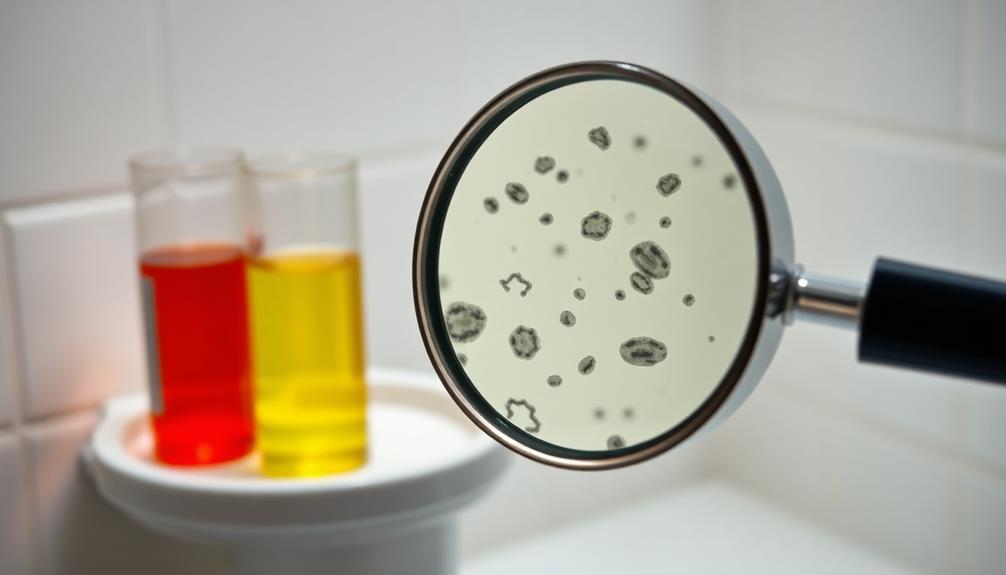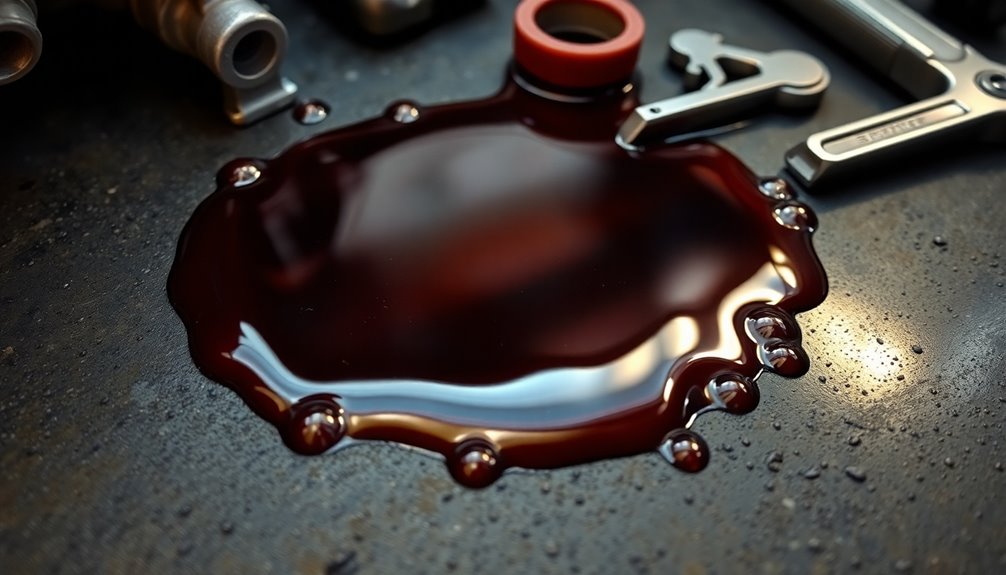Urine has a unique smell that can reveal a lot about your body! Normally, it has a mild odor, but if you're dehydrated, it might smell stronger, almost like ammonia. Certain foods, like asparagus or garlic, can create a distinct scent too. If urine smells sweet, it could mean high blood sugar, while foul smells might signal infections. Remember, what you eat and your health can really change the smell. Staying mindful of these changes can help you catch any potential issues. Curious about what else those smells might mean? Let's explore further together!
Key Takeaways
- Normal urine has a mild odor, while dehydration can lead to stronger, ammonia-like smells.
- Certain foods, like asparagus and garlic, can temporarily alter urine's scent.
- Sweet or fruity odors may indicate high blood sugar or diabetes.
- Foul-smelling urine might suggest urinary tract infections or kidney issues.
- Medications and vitamin intake can also change urine's aroma significantly.
Introduction

Understanding the smell of urine can provide valuable insights into your health. When you think about pee, you mightn't realize it carries clues about how well your body is doing. Normal urine has a mild odor, but strong urine odor can pop up for several reasons. If you're dehydrated, your urine might smell stronger because it's more concentrated.
Additionally, monitoring other bodily functions, such as newborn bowel movements, can also be important for overall health assessment.
Have you ever noticed a sweet smell in your urine? That could be a sign of high blood sugar levels, which might indicate diabetes or diabetic ketoacidosis. On the other hand, if your pee has a foul smell, it could mean you have a urinary tract infection or even kidney issues.
Certain foods, like asparagus or garlic, can also change your urine odor temporarily. Medications and vitamin supplements, especially vitamin B6, can intensify the smell of your urine too.
By paying attention to these changes, you can take part in a simple health assessment. If unusual odors persist, it's time to consult a healthcare professional.
Description of the Smell

The aroma of urine varies significantly based on a range of factors, including hydration levels and diet. Normally, urine smells mild, thanks to urea and other waste products.
Proper hydration is essential for maintaining overall health and can also impact cognitive functions, as nutrition's role in development is critical for brain performance. However, when you're dehydrated, your urine can smell much stronger, often resembling ammonia. This concentrated odor is a clear sign that your body needs more fluids!
Certain foods, like asparagus and garlic, can also change the way urine smells, giving it a unique twist.
If you notice sweet or fruity-smelling urine, it might be a signal of high blood sugar, which can happen with diabetes. That's something worth paying attention to!
On the other hand, if your urine has a foul or unusually strong odor, it could indicate potential health issues, like urinary tract infections (UTIs) or kidney problems. In these cases, it's best to consult a healthcare professional for a check-up.
Source and Composition

Urine's composition reveals a fascinating balance of water and waste products. Did you know that about 95% of urine is water? The other 5% is made up of urea, creatinine, uric acid, and various dissolved ions and metabolites. This mixture comes from your body processing food and eliminating waste products.
Interestingly, just as air quality can be affected by various factors, the smell of urine can also be influenced by your overall health and diet, highlighting the importance of maintaining optimal body function.
Typically, the smell of urine is mild, but it can become stronger if you're dehydrated or if there are high levels of waste products. Your diet plays a big role too! For instance, foods like asparagus, garlic, or coffee can change the smell of your urine due to special compounds your body excretes.
Certain vitamins, especially B vitamins, can also make urine smell different. If you take medication, that might add a distinct odor as well.
Moreover, some medical conditions, like urinary tract infections or metabolic disorders, can lead to unusual or foul-smelling urine. Keeping an eye on these changes can help you understand what's happening in your urinary system, ensuring your body stays healthy and balanced!
Typical Scenarios or Environments

Various scenarios can influence the smell of your urine, making it an interesting indicator of your health. For instance, if you've eaten asparagus or garlic, you might notice that your pee smells quite strong shortly after. That's just the way certain foods interact with your body!
When you don't drink a lot of water, your urine can become more concentrated, leading to a pungent ammonia-like odor. This can be a warning sign that you need to hydrate.
In some cases, you might find that urine that smells sweet could indicate a health condition, such as diabetes. If you're on certain medications like antibiotics or vitamins, especially B6, your pee smells might change too!
It's also important to pay attention when you're in environments with poor sanitation or if you suspect urinary tract infections. In these situations, urine may develop a foul smell, indicating you should seek medical attention.
Always remember, your urine can tell you a lot about your health. So, the next time you notice a change in odor, think about what you've eaten, how much water you've had, or any health conditions you might have!
Emotional or Cultural Associations

Changes in urine smell can stir up strong emotions and cultural perceptions around health and hygiene. You might notice that a strong urine odor can lead to feelings of embarrassment or even shame, especially in cultures where personal hygiene is highly valued. Many people adjust their dietary choices, avoiding certain foods that can cause unpleasant smells to dodge social stigma.
In art and literature, urine odor often symbolizes decay or loss, reflecting societal views on bodily functions. Some cultural practices focus on managing urine odor through natural remedies or specific foods, highlighting the importance of maintaining a fresh scent.
Interestingly, in some traditions, urine's smell is believed to have medicinal properties. This belief has led to practices like urine therapy, where people utilize urine for its supposed health benefits.
Understanding these emotional and cultural associations helps you see how something as simple as urine odor can influence feelings and behaviors across different societies.
Health or Safety Considerations

When you notice a strong odor coming from your urine, it can be a signal that something isn't quite right with your body.
Normally, urine has a mild smell, but certain urine odors can hint at health issues. For instance, a sweet or fruity pee smell might suggest high blood sugar levels linked to diabetes. If you notice this, it's important to get a medical evaluation quickly.
On the other hand, a strong ammonia odor is often a sign of a urinary tract infection (UTI), especially if you experience painful urination or cloudy urine.
If these unusual urine odors persist for more than a few days or come with symptoms like fever, it's best to consult your healthcare provider.
Final Thoughts

In summary, paying attention to the smell of your urine can provide valuable insights into your health.
Normally, urine has a mild scent and should be a pale yellow color. If you notice a strong ammonia-like odor, it might mean you're dehydrated or dealing with a urinary tract infection. Sweet or fruity smells could suggest diabetes or other metabolic issues, so it's essential to pay attention.
Certain foods like asparagus or garlic can make your pee smell different, and some vitamins and supplements can also change the scent.
However, if you ever notice a strong, rotting fish odor, it could indicate fish odor syndrome or even a problem with your liver. In these cases, it's crucial to see your doctor for further evaluation.
Frequently Asked Questions
How Do You Describe the Smell of Urine?
When you describe urine's smell, you might notice it varies from mild to strong, influenced by hydration levels and diet. Certain foods or health conditions can amplify its scent, making it distinct or unusual.
What Does Infected Pee Smell Like?
Infected urine often has a strong, foul odor, resembling ammonia. You might notice it's cloudy or murky, and you could experience painful urination or increased frequency, which signals the need for medical attention.
What Else Can Smell Like Urine?
You might notice that certain foods, like asparagus, and pets' urine can smell similar to urine. Dehydration and specific medications can also create strong odors, while infections may produce a discharge that resembles urine's scent.
What Does Diabetic Urine Smell Like?
If you have diabetes, your urine might smell sweet or fruity. This odor often signals high glucose levels or potential complications like diabetic ketoacidosis. It's crucial to monitor these changes and consult your healthcare provider.









